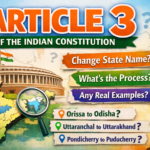Uniform Civil Code: Balancing Uniformity and Diversity

Prime Minister in his Independence Day speech talks about Secular Civil Code. Currently, Uniform Civil Code(UCC) is applicable only in Goa, while a bill is under discussion in Uttarakhand.
Uniform Civil Code
comes under Article 44 of the Indian constitution. The article comes under Part 4 of the Indian Constitution. Part 4 refers to Directive Principles of State Policy. (Art 36-51)
ART 44
“The State shall endeavour to secure for the citizens a uniform civil code throughout the territory of India.”
The purpose of the Article is the implementation of a unified set of laws intending to govern each and every citizen. It proposes to replace personal laws applicable to each religious community in India based on customs and scriptures. Personal Laws such as marriage, inheritance, divorce, and adoption.
It seeks to provide a uniform personal law that currently vary among different religious communities in India, including Hindus, Muslims, Christians, and others.
UCC proponent argues that its implementation will ensure Gender Equality. UCC would challenge obsolete traditions and religious dogma’s. It would provide fair treatment and equal rights to women in society.
Those who oppose UCC argues that it will infringe upon religious freedom and cultural practices especially of minorities. Moreover India has immense cultural and religious diversity prevalent across the country.
The current debate over UCC has to navigate issues of gender equality, individual rights, religious freedom, and social justice. An informed debate and taking all communities into confidence is the need of the hour.
The government has to balance between uniformity and diversity, between individual rights and community rights, and between tradition and modernity.
Court Rulings
Shah Bano Case (1985)
This is one of the most famous cases related to personal laws and the UCC. The Supreme Court ruled in her favour, recognising her right to maintenance under Section 125 of the Criminal Procedure Code, irrespective of her religion.
Mary Roy Case (1986)
In this case, Mary Roy The Supreme Court ruled that gender discrimination in inheritance laws violated the constitutional principles of equality.
Triple Talaq Cases (2017)
A series of cases challenging the practice of triple talaq (instant divorce) in Islam led to a landmark judgment by the Supreme Court in 2017. The court declared the practice of triple talaq unconstitutional, stating that it violated the rights of Muslim women.
| FUNDAMENTAL RIGHTS | DIRECTIVE PRINCIPLES OF STATE POLICY |
| Justiciable Political Rights | Non-Justiciable Socio-Economic rights |
| Aims to establish Political Democracy | Aims to establish Socio-Economic Democracy |
| Guaranteed by the Constitution. It has Legal Sanction | Negative in nature. It limits the power of the state. |
| Negative in nature. It limits power of the state. | Positive in Nature. Require the state to do certain things. |






0 Comments